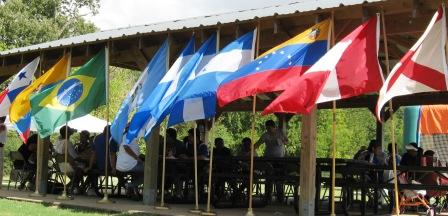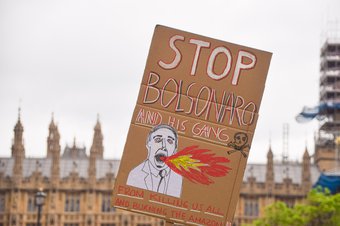MARCH 3, 2023
Scores of hits from publications across the globe pop up from an internet search for veteran investigative reporter Seymour Hersh’s claim that the US destroyed Russia’s Nord Stream gas pipeline.

The British news agency Reuters (2/9/23) ran at least ten stories on Seymour Hersh’s Nord Stream report; the US AP didn’t run one.
But what is most striking about the page after page of results from Google, Bing and DuckDuckGo in the weeks following the February 8 posting of Hersh’s story isn’t what is there, but what is not to be found:
- The Times of London (2/8/23) reported Hersh’s story hours after he posted it on his Substack account, but nothing in the New York Times.
- Britain’s Reuters News Agency moved at least ten stories (2/8/23, 2/9/23, 2/12/2, 2/15/23, among others), the Associated Press not one.
- Not a word broadcast by the major US broadcast networks—NBC, ABC, CBS—or the publicly funded broadcasters PBS and NPR.
- No news stories on the nation’s major cable outlets, CNN, MSNBC and Fox News.
Is there justification for such self-censorship? True, Hersh’s story is based on a single anonymous source. But anonymous sources are a staple of mainstream reporting on the US government, used by all major outlets. Further, countless stories of lesser national and international import have been published with the caveat that the facts reported have not been independently verified.
Doubts about Hersh’s story aside, by every journalistic standard, the extensive international coverage given the story, as well as the adamant White House and Pentagon denials, should have made it big news in the United States.
More important, if Hersh got it wrong, his story needs to be knocked down. Silence is not acceptable journalism.
News blackout

The online magazine Newsweek (2/8/23) was one of the few notable US outlets to cover Hersh’s report as a news story.
What’s not in doubt is the remarkable breadth of the news blackout surrounding Hersh’s story. The only major US newspaper to cover it as breaking news was the New York Post (2/8/23).
It did appear on the opinion pages—but not the news columns—of two major dailies. The Los Angeles Times (2/11/23) mentioned Hersh’s story in the 11th paragraph of a weekly round-up by the letters editor. On the New York Times opinion page (2/15/23), Ross Douthat included Hersh in a column headlined “UFOs and Other Unsolved Mysteries of Our Time.”
Fox News firebrands Tucker Carlson (2/8/23) and Laura Ingraham (2/14/23) collectively gave Hersh’s story a few minutes on their cable TV shows, but their network didn’t post a news story. On Fox News Sunday (2/19/23), National Security Council spokesperson John Kirby was asked about Hersh’s claims. But, again, Fox News didn’t do a separate news report.
Newsweek (2/8/23) has covered the story , but focusing mainly on White House denials and Russia’s reaction. Bloomberg News (2/9/23) ran a four-paragraph follow-up that also stressed the Russian response, but provided no details of Hersh’s account of the bombing.
The Washington Post’s first mention of the story (2/22/23) came two weeks after it was posted. Again, Russian reaction was the hook, as seen in the headline: “Russia, Blaming US Sabotage, Calls for UN Probe of Nord Stream.”
‘Discredited journalist’

Focusing on a story’s acceptance by an official enemy (Business Insider, 2/9/23) is a good tactic for promoting unquestioning rejection of information that challenges official narratives.
Arguably the most influential coverage of Hersh’s story came from Business Insider (2/9/23), which posted what can justly be called a hit piece, given its blatantly loaded headline: “The Claim by a Discredited Journalist That the US Secretly Blew Up the Nord Stream Pipeline Is Proving a Gift to Putin.”
The Business Insider article was picked up by Yahoo! (2/9/23) and MSN (2/9/23). It also was the primary source of an article in Snopes (2/10/23), the only major factchecking site to weigh in on Hersh’s claims. But Snopes, which bills itself as “the definitive Internet reference source for researching urban legends, folklore, myths, rumors and misinformation,” didn’t check any disputed facts. Instead, it starts with an ad hominem attack, asking “Who is Seymour Hersh?”
Snopes answers that rhetorical question by summarizing his body of work—uncovering the My Lai massacre in Vietnam, for which he received the Pulitzer Prize in 1970, revealing the secret bombing in Cambodia and the torture of prisoners at Abu Ghraib in Iraq—but emphasizing that “his later work, however, has been controversial and widely panned by journalists for promoting conspiratorial claims that hinge on dubious anonymous sources or speculation.”
Snopes’ presentation is hardly even-handed. No defenders of Hersh are cited in the four-paragraph overview of his work, which includes seven hyperlinks to sources. That looks impressive. But clicking on the links reveals four are to the same source: the Business Insider hit piece.
Snopes’ failure to acknowledge multiple links to the same source isn’t just sloppy, it’s misleading, because most readers don’t check to see if the same source is cited repeatedly.
It’s likely Snopes used the Business Insider piece a fifth time—the last without attribution. The Snopes article’s final sentence states: “Hersch [sic] was asked by the Russian news agency TASS about the identity of his source. He told them that, ‘It’s a person, who, it seems, knows a lot about what’s going on.’ ”
The Business Insider piece ends with a paragraph with the same misspelling of Hersh’s name, the same TASS link and identical—word for word — translation of his response. (It doesn’t help Snopes’ credibility as a factchecker that Hersh’s name was originally misspelled two other times in the article.)
Much of the remainder of Snopes’ article consists of quotes from Hersh’s story, followed by commentary disparaging Hersh’s reliance on a single, unnamed source. Since that’s something Hersh readily acknowledges, it’s hard to see the informational value of the Snopes article.
Competition, not just critics
While several bloggers have challenged details in Hersh’s account, no news outlet has answered the only question that matters: Who blew up the pipeline?
Waiting for official explanations appears to be a dead end. Sweden, Denmark and Germany have launched investigations, but have not indicated when—or if—results would be released.
The giants of US journalism—the New York Times, Washington Post and the major broadcast networks—have the resources to try and solve the mystery. And it’s certainly possible that one or more of them are working to do just that. But the pipelines were destroyed five months ago. Since then, Seymour Hersh is the only journalist to offer an explanation of who was responsible.
There should be others. Hersh needs competition, not just critics.
Originally published on FAIR.org, February 2nd, 2023. Reprinted with permission.








